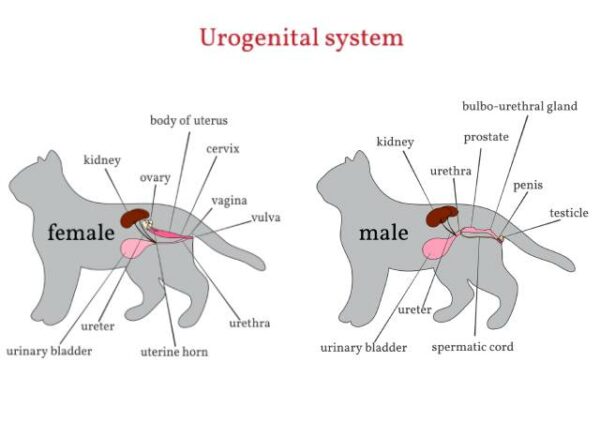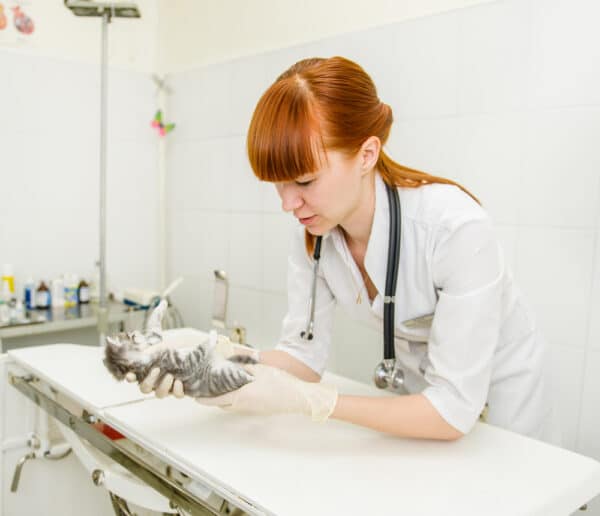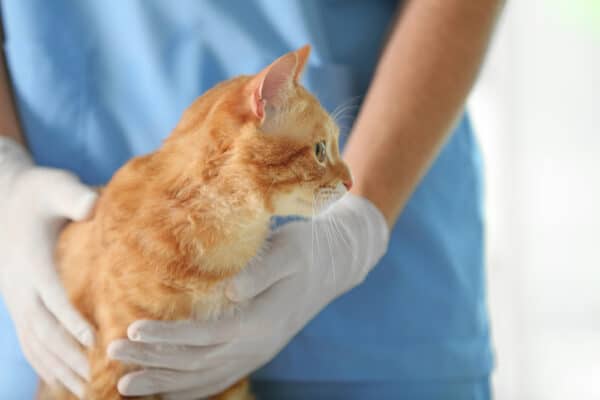If your cat has stopped using the litter box or is facing difficulty in urination, it’s important to have her examined by your veterinarian as soon as possible to rule out urinary tract disease or infection, which are common health issues in cats.
Urinary tract disease in cats often results from low-grade infections that don’t cause enough signs to be noticed by the owner but can easily be treated when identified and can be serious if left untreated.
In this guide, we’ll discuss the causes and symptoms of these diseases and infections, as well as treatment and prevention that can help your cat feel better more quickly.
Keep Reading!
Overview of the Urinary System of Cats
A cat’s urinary system is quite similar to a human’s and it has different main parts. The kidneys produce urine which then flows through the ureter to the bladder.
The bladder stores the urine until it is ready to be expelled from the body. The urethra then carries it outside.
The One Thing Pet Owners Regret Not Doing Until It’s Too Late
Is your pet safe?
1 in 3 pets will need emergency veterinary treatment each year and it is estimated a pet receives emergency care every 2.5 seconds in the U.S.
The average cost of treating a broken bone in dogs is $2,700. Cancer treatments? Up to $10,000.
It’s why so many pet owners say their biggest regret isn’t the vet bill—it’s not having pet insurance when they needed it most.
Ask yourself: “If an unexpected $5,000 vet bill hit tomorrow, could I afford it?”
If the answer is no, it’s time to get covered.
Take a look at Lemonade. They have a great app that actually works, they have an instant chatbot that is faster and, dare we say it, friendlier than most companies’ “real” customer service and a quick scroll through Reddit will uncover… people are really vibing with this brand.
So go check them out and take a look. It takes less than a minute.
The urethra is a tube connecting the bladder (where urine is stored) with the outside world at the end of a cat’s penis or vulva.
What is Feline Urinary Tract Disease?
Urinary tract disease in cats is a collective term for any inflammation or infection of the bladder and urethra.
This condition is also known as Feline Lower Urinary Tract Disease (FLUTD). The most common form of feline lower urinary tract disease is an obstruction in the urethra or cystitis.
FLUTD can be caused by bacterial infections, but this is not always the case. Your veterinarian will need to perform tests to determine the cause of your cat’s urinary tract disorder depending on the cat’s health.
Why is it Important to Understand Feline Urinary Tract Disease?
It is important to understand the symptoms and treatment of feline urinary tract diseases in order to prevent unnecessary suffering and health complications because it is extremely challenging to treat UTIs in cats due to their anatomy and activities.
If left untreated, the result of urinary tract diseases can be painful urination and severe infection which can be life-threatening.
Common Causes of Urinary Tract Disease in Cats
Feline urinary tract disease can be the result of genetics, environmental stress, diabetes, hyperthyroidism, injury, or other medical conditions. There are many different types of this condition and they present differently depending on the type of disease.
Some common causes of UTD include:
- Urolithiasis
- Urinary Tract Infection
- Urethral Obstruction
- Feline Idiopathic Cystitis
Urolithiasis
Urolithiasis is one of the major causes of Feline Urinary Tract Disease (FUTD), which is characterized by stone formation in the urinary tract.
It is a common medical condition in felines. It can cause obstruction, irritation, and infection of the bladder and kidneys.
The stones are usually caused by too much calcium or animal protein in the diet and sometimes obesity.
The stones may also form because of a lack of water intake or an underlying disease such as diabetes, hyperthyroidism, kidney disease, or bladder cancer.
It’s most common in senior cats that are over 8 years old and male cats are more prone to this disorder than females. If left untreated it can lead to bladder and kidney damage.
Signs include:
- Straining to urinate
- Urinating outside the litter box
- Blood in the urine
- Dripping of urine
- Frequent urination
- Licking of genital
- Pain while urinating
Urinary Tract Infection
In cats, another common cause of Feline Urinary Tract Disease (FUTD) is a urinary tract infection also called UTI.
This infection can be caused by infectious bacterial agents, viruses, parasites, or fungi. In some cases, these types of infections can lead to urethral obstructions and even death if not treated promptly and appropriately.
The most common bacterial infections that cause these problems in cats are Staphylococcus, Escherichia coli, Enterococcus, and Streptococcus.
A UTI can lead to kidney damage, an increased likelihood of developing diabetes mellitus or chronic renal failure, and even death if not treated quickly enough.
Common symptoms include:
- Frequent urination
- Straining to urinate
- Blood in the urine
- Pus mixed urine
- Urinating small amount
Urethral Obstruction
There is no doubt that this disease can be caused by many different factors. However, urethral obstruction is the leading factor of Urinary Tract Disease.
A urethral obstruction occurs when there is an accumulation of urinary crystals or stones that block the urethra and prevent the cat from urinating.
The severity of this condition will depend on how long it has been occurring and how many times the cat has been blocked from urinating.
If the condition has been occurring for a while or the number of obstructions is high, then this could lead to serious complications such as rupturing of the bladder.
Causes of urethral obstruction:
- Urethral plugs
- Urinary stones
- Strictures
- Pus
- Tumors
- Urethral spasms
- Swelling around the urethra
- Inflammation
Feline Idiopathic Cystitis
Feline idiopathic cystitis is also known as interstitial cystitis is the inflammation of the bladder lining.
It is a painful infection caused by bacteria that enter through the urethra and spreads up into the bladder’s lining. Feline interstitial cystitis is more common among female cats than males.
Cystitis can cause blood in urine, difficulty urinating, and frequent urination (especially at night). Other signs include increased thirst and frequent attempts to urinate or defecate outside of the litter box.
How is Feline Urinary Tract Disease Diagnosed?
Feline urinary tract disease can be difficult to diagnose because there are many possible causes and not all cats show the same symptoms.
Your veterinarian will perform a physical exam that includes looking at the cat’s genitals for inflammation or discharge.
There may also be some tests done to look for signs of kidney damage. Diagnosis typically involves the analysis of a urine sample under a microscope.
A urinalysis can be used to determine whether there are bacteria in the urine and to rule out other potential causes such as a bladder infection.
Additional testing that can be performed by your veterinarian is:
- Urine pH and concentration
- Urine culture
- Blood Test
- X-rays
- Abdominal ultrasound
What is a possible Treatment?
The most common treatment for UTI is antibiotics, but this is only if the infection is bacterial. If the infection is not bacterial, then another form of treatment will be prescribed to help relieve symptoms.
For example, cats with UTIs can be given pain medication or anti-inflammatory drugs to help decrease inflammation and discomfort.
In some cases, surgery may also be necessary to remove an obstruction from the bladder or urethra.
The prognosis varies depending on the severity of the symptoms. A cat that has a mild case of UTI can recover within 3-5 days.
However, severe cases where there is a blockage or damage to the urinary tract might require surgery to save their life!
What to Do if Your Cat Shows Symptoms?
If you suspect your cat may have a urinary tract disease or infection, schedule an appointment with your veterinarian as soon as possible.
Patients have a better chance of recovering if treatment is initiated early. Timely diagnosis and treatment of UTIs can prevent further complications.
Can Both Male and Female Cats Have Urinary Tract Problems?
Male and female cats can both develop urinary tract diseases, although it is more common for male cats to have them. Due to their longer and thinner urethras, male cats are more likely to experience obstructions.
In male cats, a blockage of any kind—from an enlarged prostate to an infected urinary tract—can put an extra burden on the kidneys. If untreated or undiagnosed for a long time, it can lead to chronic kidney failure.
Females are most commonly affected by Feline idiopathic cystitis. It is possible for the bladder to rupture in female cats with a urinary tract infection.
Steps to Prevent Urinary Tract Disease
Maintaining your cat’s urinary health is not an easy task. Urinary tract infections are one of the leading causes of feline death and they can happen to any cat. The following steps will help you prevent UTIs.
- Give Your Cat More Water
- Change Your Cat’s Diet
- Reduce Environmental Stress
- Use Advanced and Quality Litter Box
Give Your Cat More Water
Cats can suffer from urinary tract infections because they don’t drink enough water. Several things can cause cats not to drink enough water such as age, diabetes, kidney disease, parasites, and some other medical conditions.
Drinking plenty of fluids will help prevent urinary tract infections as well as increase their overall health by reducing the risk for many diseases such as cancer and heart disease.
Change Your Cat’s Diet
One of the best ways to prevent UTIs is to change your cat’s diet. Feeding canned food rather than dry food can help because it has more water content and is easy to digest.
Feeding wet cat food will help hydrate your pet and avoid dehydration which can lead to a host of other health problems.
If you feed dry food, try supplementing with some canned wet cat food mixed in or replacing all dry with wet cat food.
You should also consider adding a water fountain for your feline friend so they have constant access to clean fresh water during the day.
Reduce Environmental Stress
Environmental stress is one of the major factors. Here are some ways to reduce your cat’s environmental stress and prevent UTIs from occurring.
- Make sure there is enough space for your cat to move around freely and get exercise.
- Play with your cat every day, or provide an alternate way for your cat to release energy such as a cat wheel or cat tree.
- Provide different types of food so that they are getting a variety of nutrients.
- Keep your house cool by using air conditioners or fans.
- Groom them regularly so that their fur doesn’t tangle too much and create knots (this can lead to infection).
Use Advanced and Quality Litter Box
The best way to avoid urinary tract diseases and infections is to have your cat use a quality litter box like Genius Cat Litter.
A litter box should be large enough for your cat to comfortably turn around in and easy for them to access.
The litter should also be scooped out on a daily basis so that waste doesn’t get absorbed into the bottom of the pan.
Clean the litter tray with soap and water weekly to reduce any odors or dirt and maintain a cleaner living space.
How Can Genius Cat Litter Help With Urinary Cat Health?
Did you know that cats that use traditional clay litter have a higher risk of developing urinary tract infections or other health issues?
Imagine if you could give your cat a better alternative than traditional clay litter.
With Genius Litter, you can provide that to your kitty. This new product is here to make life easier for you and your feline friend. What do you think?
Genius Litter is made up of silica gel crystals that change color based on the health of your cat’s urine, detecting blood, alkaline levels, albumin, and abnormal pH levels.
Another top advantage of Genius Litter is that it is non-clumping which means less scooping. And once-a-month refills mean one bag lasts weeks longer than traditional smelly clay litter.
Is it Important to Have Regular Veterinary Checkups?
A regular veterinary checkup is important to maintain good health and provide early detection of any diseases before they become serious. Ask your veterinarian about regular testing such as urine analysis, blood tests, x-rays, ultrasounds, and more to ensure the best care for your cat!
Key Takeaways
- The term urinary tract disease in cats refers to any inflammation or infection of the bladder and urethra. It is also known as Feline Lower Urinary Tract Disease.
- Urinary tract disease is a very common and serious condition in cats. If left untreated, a UTI can cause long-term damage to the kidneys and liver which may result in kidney failure, blood in their urine, dehydration, weakness, and anemia.
- It is important to be able to identify the symptoms of a urinary tract disease or infection in cats so that you can get treatment as soon as possible.
- There are many different causes for UTIs including bladder stones, bacterial infections, and inflammation.
- Urinary tract diseases are treated with antibiotics and sometimes surgery to remove bladder stones or other obstructions.
- Always consult your veterinarian if your cat is showing any signs of urinary tract disease or infection.
Pro Tip:
It can be very stressful and concerning when a beloved pet is not feeling well, so it’s worth it to get pet insurance to make sure you can cover the veterinary bills.
Importance of Pet Insurance
Pet insurance is a great way to protect your animal’s health. It can be hard to predict when an accident will happen, but with pet insurance, you’re covered.
There are a few different types of plans depending on your needs, and it only takes minutes to get coverage for your pet.
Some pet insurance companies will even cover 100% of veterinary expenses. So make sure to choose the best pet insurance plan for your furry friend.
Once you have a plan in place, vet bills will never be too high because they’ll already be covered by the policy.
It’s important that we all take care of our animals’ safety and well-being so they can enjoy their lives just as much as we do ours.
What Makes Genius Litter Different From Ordinary Litter?
Say goodbye to hauling heavy bags and hello to easy Genius Litter.
With our innovative non-clumping litter formula, you’ll need less of it. One bag of our disposable Genius Litter lasts up to a month, so you won’t need to refill the box as often and can save money on monthly costs.
One thing that separates us from traditional litter is that Genius Litter changes color to indicate when your cat has a potential health issue, so you can get them help before it becomes an urgent medical situation.
All you need to do is set up a delivery date with us each month, and rest easy knowing that Genius Litter will arrive at your doorstep every 30 days.
For a convenient solution for your cat, try Genius Litter today!
Why Is Lysine So Important For Your Pet?
Protect your pet’s immunity!
Have you noticed that your cat is coughing, sneezing, and having rapid breathing? Or maybe he/she has been scratching more than usual?
These are all signs of a weakened immune system. One way to prevent this from happening is by using lysine supplements.
Lysine plays a key role in your pet’s immunity because it helps to regulate the immune system.
Without enough lysine, your pets will be more susceptible to illness because their immune system can’t fight off infections as efficiently.
When they are sick, they will also be less able to absorb nutrients and make use of other supplements that can help them feel better.
Give your pet the support they need. Our Lysine supplement provides essential amino acids to help support a strong immune system.
Order now to get 300 one-scoop servings or 150 two-scoop servings and don’t worry about expiry!
80% of Dogs Develop Arthritis or Joint Pain by 7 Years old – Here’s How to Protect Them
Most of us train our dogs when they are puppies to jump up on furniture. We think it’s harmless (and easier than always lifting them), but for dogs, couches and beds are very high compared to the size of their bodies.
Every time they jump it compresses their back and applies enormous force to their joints.
It’s no wonder that an incredible 80% of dogs experience arthritis or joint pain by only 7 years old.
Luckily, there is a vet-recommended solution.
It’s the PawRamp by Alpha Paw. An adjustable ramp that allows dogs to safely get on and off couches and beds. PawRamp makes joining you in bed or on the couch effortless and fun.
As a bonus, you can use code SAVE35 to get $35 off the PawRamp today.















